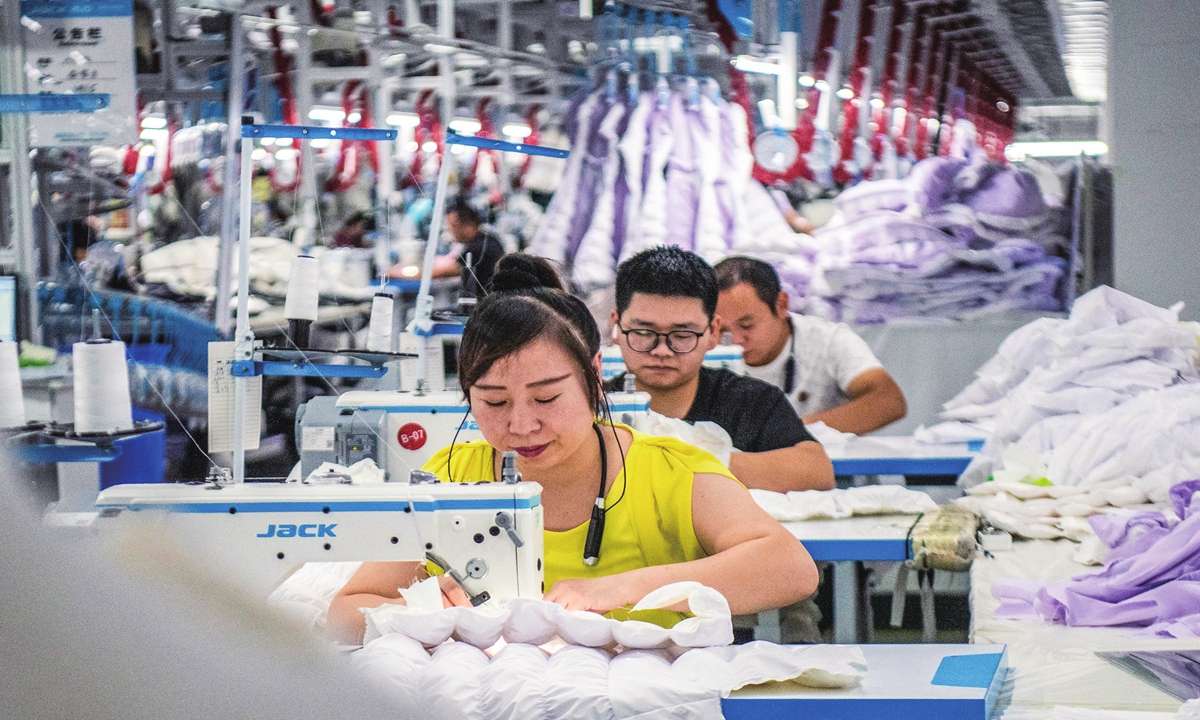Crackdown on online fashion industry goes against development of China-EU free trade

Workers are busy producing export-oriented clothes ordered by overseas clients at a garment factory in Suncun town in Wuhu city, East China's Anhui Province on August 29, 2023. Photo:cnsphoto
On March 19, the French Senate unanimously adopted the Anti-Fast Fashion Bill proposed by the political group Horizons, aiming to exert greater supervision over online platforms like Shein and Temu that sell fast fashion products. According to the bill, France is suggested to impose a "sin tax" penalty on fast fashion businesses, with penalties per product being valued at €5 in 2025, €6 in 2026, €7 in 2027, €8 in 2028, €9 in 2029, and €10 in 2030. It will prohibit advertising and marketing for certain players and require companies to disclose environmental protection-related information about their products. This bill represents a new form of trade protectionism within the context of the geo-economic landscape.The definition of the "fast fashion" industry has been a contentious issue in international trade. The Anti-Fast Fashion Bill proposes the clear definition of "fast fashion," establishing thresholds determining when a company is considered to be practicing fast fashion based on the number of clothing items released annually. According to statistics, ultra-fast fashion companies like Shein launch thousands of new styles daily, while European brands, such as Zara, unveil about 12,000 new styles annually. This tiered regulation reflects the logic of European industrial protectionism, which apparently violates the WTO's non-discrimination principle.
French Republican MP Sylvie Valente-Le Hir stated in an interview with Public Sénat that this flexibility allowed France to target the two Chinese online retail giants, Shein and Temu, which are her priority. Additionally, she expressed a wish to exempt French and European brands, particularly Zara and H&M, even though their business models have also been questioned, because these brands keep city centers alive, she explained.
Critics of the bill contend that it represents an "unfair tax" that would burden impoverished populations and limit their access to affordable fashion choices. Shein holds a 13 percent market share in France (2023), with annual sales nearing $32 billion, and its low-price strategy (with an average product price of €7) attracts a large number of ordinary consumers.
Clearly, this bill overlooks the fundamental realities of socioeconomic inequality in French society. The bill's differentiated policy targeted at specific enterprises clearly violates the WTO's non-discrimination principle, with fundamental problems in both specific content and implementation. Public opinion believes that a complete ban on fast fashion advertising is an "extreme" infringement of commercial freedom. Shein's business platform is highly dependent on digital marketing models, and the advertising ban will severely damage its business.
In addition, this bill fails to address core issues such as overproduction in the textile industry and supply chain pollution. Even from an environmental protection perspective, this legislation neglects innovations at the production level and focuses solely on punitive measures at the consumption level, which is likely to reinforce the technological monopoly of European enterprises.
The Anti-Fast Fashion Bill is essentially an experiment under the pressures of reconstructing global value chains in the digital era, and its subsequent developments will significantly influence the competitive landscape between China and Europe concerning the rule-making power in green trade.
Through joint promotion by the leaders of both countries, France and China created the "French farm to Chinese dining table" mechanism in 2023, forming a pattern of in-depth and integrated cooperation. As both China and France are staunch defenders of free trade and opposers of trade wars, they should resolve trade disputes through dialogue, and the Anti-Fast Fashion Bill should not become a stumbling block for the two countries to boost bilateral trade.
The author is the director of the Center for British Studies at Shanghai International Studies University, and China Forum expert of the Center for International Security and Strategy at Tsinghua University. opinion@globaltimes.com.cn


